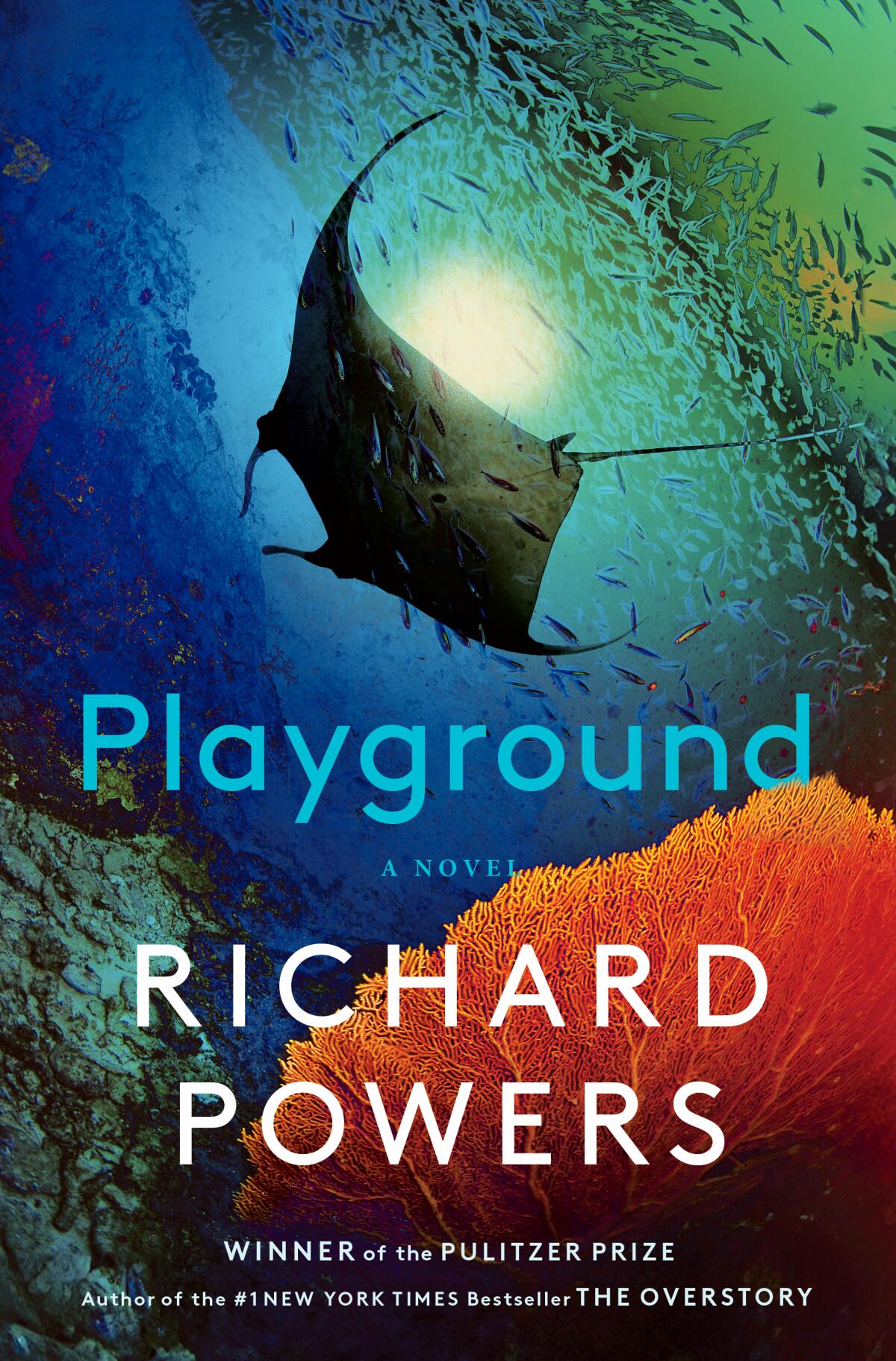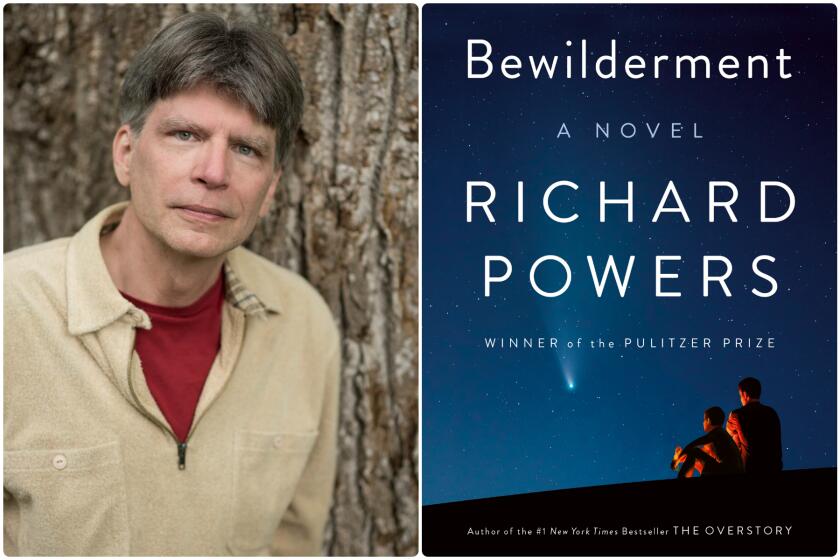Richard Powers’ latest epic: Fragile oceans, fraught tech and exhilarating writing. At first

- Share via
Book Review
"Playground: A Novel"
By Richard Powers
W.W. Norton, 400 pages, $29.99
If you buy books linked on our site, The Times may earn a commission from Bookshop.org, whose fees support independent bookstores.
Richard Powers has long been fascinated by artificial intelligence. As far back as 1995, his novel “Galatea 2.2” reimagined the Pygmalion story through that lens, unfolding in a computer lab at the University of Illinois Urbana-Champaign, where the author studied as an undergraduate and went on to teach. “Plowing the Dark” (2000) presents a twinned narrative: The first involves an American hostage in Lebanon who uses recollection to preserve his sanity and the second, a group of researchers attempting to create an immersive virtual environment in three-dimensional space.
In both, the stakes couldn’t be higher: the relationship between memory and imagination, the endlessly regenerative possibilities of the human mind and the challenges (or even outright risks) of technology. “Playground,” Powers’ latest novel, occupies a related territory, moving back and forth between environmental and digital concerns, between the troubled ecosystem of the oceans and the fraught ethics and dislocations of the virtual world. And why not? Powers’ books, after all, often read as installments in an extended suite of narratives, circling back on one another in a slipstream of ideas and reference points.
A piece of “Playground,” like “Galatea 2.2,” takes place at Urbana-Champaign; like “Plowing the Dark,” the novel relies on a braided structure, with one thread focusing on the French Polynesian island of Makatea and the other told in the voice of Todd Keane, an AI pioneer whose project Playground — think Facebook crossed with ChatGPT and Google but refracted through a gamer’s sensibility — has made him a billionaire. At its center, however, “Playground” presents a set of overlapping love stories, requited or otherwise, involving parents and children, friends and most essentially humanity and the oceans we have both studied and soiled.

“The course of civilization is carved in currents,” Powers observes. “Where sea layers mix, where rains travel or wastelands spread, where great upwellings bring deep, cold, nutrient-rich waters to the energy-bathed surface and fish go mad with fecundity, where soils turn fertile or anemic, where temperatures turn habitable or harsh, where trade routes flourish or fail: all this the global ocean engine determines.”
The epic sensibility of this passage echoes Powers’ 2018 Pulitzer Prize-winning “The Overstory.” Both that book and “Playground” are what we might call systems novels, a term coined in 1987 by the critic Tom LeClair to describe fiction trafficking in social, political or global networks.
Richard Powers’ ‘The Echo Maker’ probes humanity’s very nature.
Because of its scope (or its success, perhaps), “The Overstory” has come to cast a vivid shadow over Powers’ body of work. Moving fluidly through the lives of nine characters, it zeroes in on the Pacific Northwest timber wars of the 1990s, a flashpoint of resistance that allows the author to address the interdependence of humanity and the biosphere. “Playground,” then, might be read as an extrapolation in which it is not forests (the so-called lungs of the planet) but oceans (let’s call them Earth’s circulatory system) that are at risk.
Think of “Playground,” perhaps, as “The Understory.”
Initially, the novel is exhilarating. Powers is a vivid writer, and it can be intoxicating to get lost in his words. “For centuries, my ancestors kept hundreds of islands spread across several thousands of miles of ocean in song-maps stored in their heads,” a Makatea artist named Ina Aroita explains. “All those islands and the paths of all the stars and the swirls of hundreds of currents and the behaviors and migrations of every sea creature. … Now all those maps are gone, and my generation of islanders are wandering around on the beach in a daze, concussed by history.”
What Ina is describing is folk knowledge, soul knowledge, from which we are all now alienated, but the brilliance of the passage resides in how the language, the lushness of it, embodies what it describes. Ina, after all, has been concussed herself, moving from Makatea to Urbana, where she meets Todd and his best friend Rafi.
The men make strange bedfellows, the former a white kid from the well-to-do Chicago suburb of Evanston, Ill., the latter Black, raised on the city’s Near South Side. What connects them is a love of games: first chess, and then, consumingly, Go, the ancient Chinese pastime characterized by its almost infinite choices and outcomes. For Powers, these endeavors offer a portal to a new sort of potential, less regenerative than exponential.
As “Playground” develops, however, it becomes increasingly mired in its polarities. On the one hand, there are the apparently unbounded capabilities of tech, which might even (or so Rafi believes) restore us from death. On the other, the tunnel vision of the tech creators, which more often than not yields to exploitation. That’s a rich binary, the kind Powers has previously explored with nuance. But here the exploration never quite comes to full three-dimensional life. Even in Rafi’s relationship with Todd, which is destroyed in part by Big Tech’s corrupting influence, Powers remains oddly neutral, even distanced.
The author of “The Overstory,” among other novels that ambitiously blend storytelling and science, takes a more intimate turn with “Bewilderment.”
A similar distance emerges in regard to Makatea, an island strip-mined for phosphate until the 1960s, after which it was mostly abandoned until a shadowy group of Californians proposes reindustrializing it in the service of “seasteading,” a form of eco-colonialism in which modular floating settlements are constructed and then launched into the ocean. The island’s 82 residents, including Ina and Rafi (whom she has married) put the matter up for a vote. Arguments are made, and a decision rendered. Yet the ethical implications — both of the effect on the island and its culture and of the environmental impact of seasteading itself — remain moot.
I don’t mean to suggest that there are easy answers to these polarities, or that Powers has to provide any answer at all. As he recognizes, consequences are always unintended and there’s no way to predict an outcome (the world as an augmented reality version of Go).
Perhaps the most vivid representative of this elusive unpredictability is Evelyne Beaulieu, a 92-year-old French Canadian marine biologist who has washed up on Makatea to finish her stay on Earth as she began it, in conversation with the deep.
A retired composer wrongly becomes public enemy No. 1 in lightning speed in Richard Powers’ moving ‘Orfeo.’
Evelyne is slipping. Time has its hooks in her. “Memory,” she insists, “should be vise-like in youth when the emerging navigator needed it most. But no one ever survived into old age who couldn’t open that vise and let much of their hard-gripped facts go free.” It’s not only Evelyne who is losing herself; half a world away, Todd faces the same hard truth, stricken at 57 with Lewy body dementia. The connection (intended, certainly, for Powers is nothing if not intentional) is that Evelyne’s first book, a primer titled “Clearly It Is Ocean,” was an early influence on Todd’s thinking about networks, after he read it as a boy.
Here, we glimpse how woven “Playground” is, with coincidence or serendipity as its own sort of network interlaced beneath the surface, not unlike the teeming currents of the sea. Still — and as opposed to, say, “Plowing the Dark” or “The Overstory” — it is oddly unsatisfying, or maybe “predetermined” or “calculated” is the better word. The collapse of Todd and Rafi’s friendship may be inevitable, but it feels like a narrative conceit rather than an emotional necessity. So too, Evelyne, who comes to an end that may be coherent with the novel’s structure but seems ungrounded in actuality.
“Games now ruled humanity,” Powers writes. “… And it made perfect sense … that the machines that would doom us cut their teeth by watching humans play.” All the same, the novel, like every virtual reality machine, must be a reflection of the world, and in this sprawling parable of a book, which has been longlisted for the Booker Prize, that world and the humans in it read, too often, like manqués or archetypes, motivated by the author’s — or the player’s — hand rather than an organic urgency of their own.
David L. Ulin is a contributing writer to Opinion. He is the former book editor and book critic of The Times.
More to Read
A cure for the common opinion
Get thought-provoking perspectives with our weekly newsletter.
You may occasionally receive promotional content from the Los Angeles Times.











